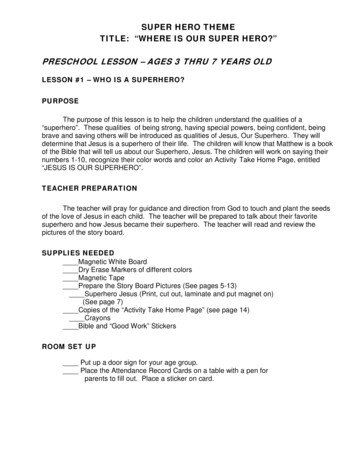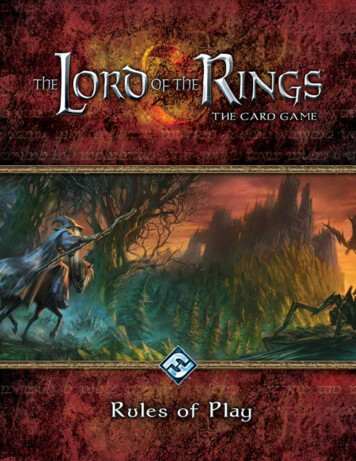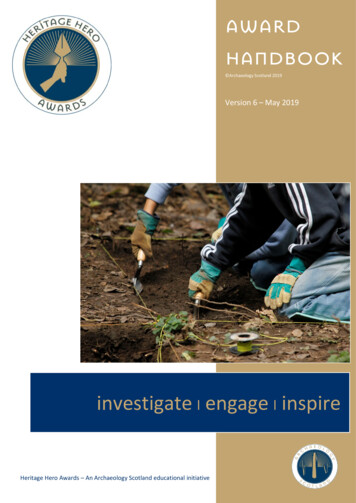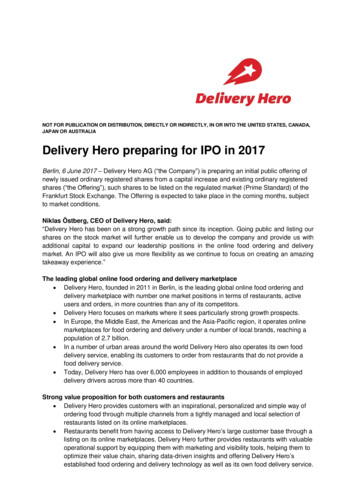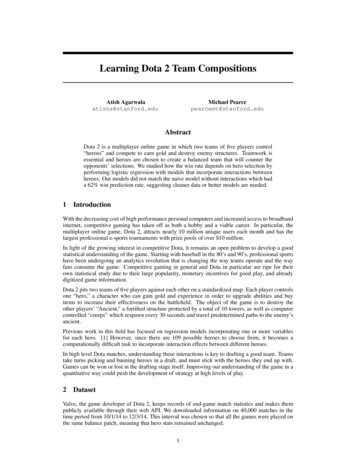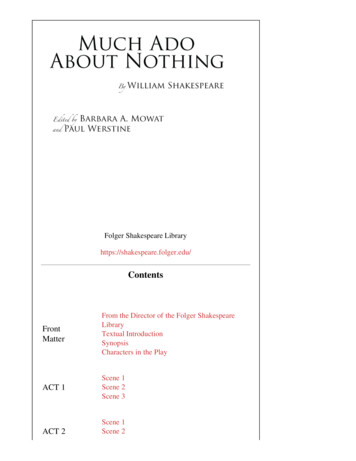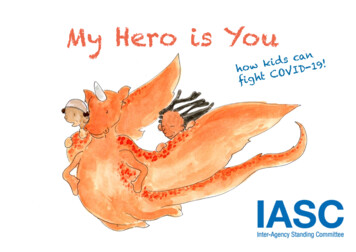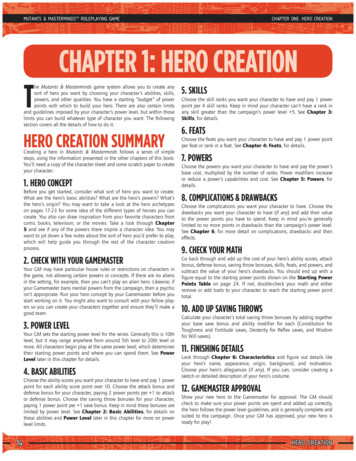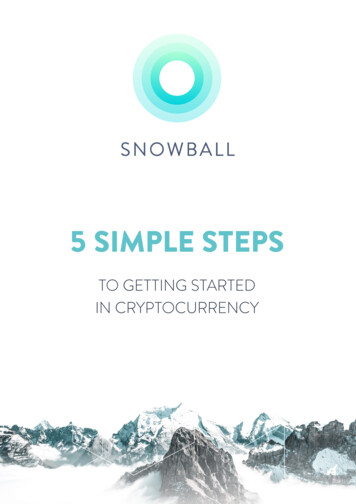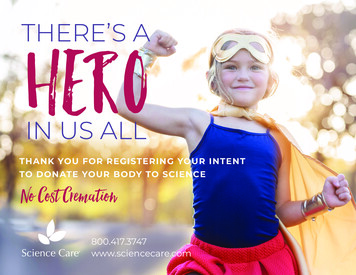
Transcription
THERE’S AHEROIN US ALLTHANK YOU FOR REGISTERING YOUR INTENTTO DONATE YOUR BODY TO SCIENCENo Cost Cremation800.417.3747www.sciencecare.com
Thank you for choosing to register with Science CareYou have joined an amazing community ofpeople committed to changing the worldthrough the advancement of medicine. Your gifthas the ability to not just improve lives, but savelives.It is our wish the information contained in this packet willhelp to show you the impact your gift can have on the world.We encourage you to educate your loved ones on your wishto donate, and want to ensure you complete all steps in yourregistration process to include signing self-consent, if possible.We have provided additional cards in this packet for you toshare with your family, friends and community on the optionof body donation to science. It is through awareness that ourprogram will continue to grow and positively impact not justyou, but your loved ones and all of society.
COVIDALERTThe scale of the COVID-19 pandemic has introduced unprecedented challenges to everyone across the globe. As a donor program, the Science Care Teamhas witnessed the devastating impact to our donors, their loved ones, our employees, our families, our healthcare professionals, and our communities firsthand.Our sincere condolences and thoughts are with the victims and loved ones that have been affected.One of the many challenges we’ve had to navigate as a donor program, which links the precious gift of donation with medical research and educationalprograms, is the tremendous impact on the placement of donated tissues. Our healthcare professionals’ focus has appropriately been primarily on saving lives, aswell as the treatment and care of the living. This has impacted the research and educational work with which they have been able to participate. The limitations ontravel, logistics, availability, and capacity have played a very large role in how our donor program has had to adjust for both our donors and our medical professionals.Although we are very proud we have been able to continue accepting donors into the Science Care Program throughout the pandemic, we know there aredonors and loved ones who have not been able to move forward with the gift of donation due to exposure or death directly related to COVID-19. Our team strivesto place every donor with available programs, but the current state of the industry has hindered our ability to place any donated tissues with those exposures. Thehealth, safety, and wellbeing of our employees, our medical and research professionals, and our communities is our number one priority. For this reason, we willcontinue to err on the side of caution, deferring donors with known risk or uncertain risks. We will stay committed to leading a safe, compliant, high-quality, ethicalprogram with the highest level of integrity. We are very optimistic our medical community will prevail, and we will be able to adjust some of our exclusion criteria asthe industry allows.We encourage anyone considering donation to make their wishes known by signing up on the Science Care Donor Registry, and proactively discussing withtheir loved ones their wish to donate. It is important to note, registration does not guarantee acceptance. Donation is conditional upon current medical suitabilityas defined by Science Care and the ability to place the donation with current medical research and education projects at the time of passing. This honors theintent of the donation and safely serves the needs of the medical community. We encourage all registrants with our program to establish an alternate plan, and todiscuss with their loved ones their wishes if donation is ultimately not possible at the time of passing. Science Care’s exclusions are outlined on our website at www.sciencecare.com. Our hearts are heavy for the donors we are not able to accept due to risk or lack of placement with current programs. We know this news comesat a very difficult time for their loved ones. It is our goal to assist in any way possible at their time of need.Since the onset of COVID-19, Science Care has continued to monitor the progression of the virus, as well as updates from the Centers for Disease Control(CDC) and all state and county level guidelines. Science Care’s mission to make a difference in the world by helping to improve the quality of life for futuregenerations has never been more important. We will continue to honor the gift of body donation to science by serving our donors and clients with an intentionalfocus.
A Letter from Science CareSince founded in 2000, Science Care has been established on public trust.Our program’s foundation is our culture of respect for donors, their loved ones,our employees, and the communities that are home to our operations. We haveone opportunity to honor a donor’s last wishes, and we take that responsibilityvery seriously.During our years as a public trust program,we have witnessed the unfortunateoutcomes of a few unethical individualsand organizations, who have threatened theintegrity and moral perception of the entireindustry. These organizations’ actions are nota reflection of the industry, but a reflectionof unprincipled individuals who tookadvantage of donors and their loved ones atan extremely difficult and vulnerable time. Asthe industry leader, our hearts extend to anydonor family touched by thisdeception.The actions of theseorganizations, coupledwith sensationalism in themedia, raises questions fordonors and their families.Our goal is to be a resourceto answer any questionsyou might have and provideyou with peace of mind inyour decision to donate toscience.Science Care partners with medicalresearchers and educators who change theworld for all of us. Because of this, donorswho contribute to the Science Care programimpact many parts of our lives. To putthis into perspective, if you or someoneyou know has ever taken a prescriptionmedication, used a skin product, had anorthopedic implant, a minimally invasivesurgery, or even been a transplant recipient,our donors have helped and continueto help train anddevelop theseareas of medicine.I can speak for allof us when I say,our donors are theunsung heroes thatlive on.As the industry leader,we are responsiblefor continuing toestablish standardsfor the non-transplanttissue bankingImportantDonation is conditional uponmedical suitability criteria atthe time of passing. This honorsthe intent of donation and safelyserves the needs of the medicalcommunity. Establishing analternate plan is advisable, as wellas informing your loved ones ofyour wishes should donation notbe possible.industry that protect our donors, their lovedones, our clients, and our communities.Recently, we participated in movements tomandate licensing and accreditation for nontransplant tissue banks in Arizona, Colorado,and Florida. The Science Care team willcontinue to support and build regulationsthat improve our industry. We want you to beproud of our program, our industry, and allthat we stand for.We are fully committed to our donors, donorfamilies, clients, and the larger industry.Thank you for your continued support of ourprogram.Tricia HammettCEO & PROGRAM DIRECTOR
Non-TransplantDonation and OrganDonation ComparisonYOU CAN REGISTER YOUR INTENT FORBOTHScience Care always encourages life-saving donation prior to body donationto science. You will need to register for both programs separately, and let yourloved ones know of your wish to donate to both organizations.Organ & Tissue Donation0.3%NON-TRANSPLANT DONATION& ORGAN DONATIONof people pass in a way thatallows for organ donationBody Donation to ScienceNon-Transplant Donation96%of people accepted in the Science Careprogram are placed with educationaland research programs /joinOptions toRegisterDriver’s LicenseOnline Registry with your local stateDescriptionOrgan donation is the process of surgically removing an organ or tissuefrom one person (an organ donor) and placing it into another livingperson (the recipient). Transplantation is necessary because the recipient’sorgan has failed or has been damaged by disease or injury.Non-Transplant Anatomical Donation Organizations, or NADOs,recover human tissue donations which are NOT intended for transplantinto a living patient.What Organsand Tissueare UtilizedHeart, Lungs, Liver, Pancreas, Kidneys, Intestines, Cornea, Middle Ear,Skin, Bone, Bone Marrow, Heart Valves, Connective Tissue, Vascularizedcomposite allografts, blood vessels, etc.Uses for medical research and education vary but can span across the entire body.Body donors for science also help to train organ and tissue transplant teams, as wellas allow them to practice transplant procedures prior to performing transplant on livepatients.WhoBenefitsAny live recipients of organ or tissue transplant, or any researcher oreducator who may acquire organs or tissue that were not able to beplaced with a live recipient.Every body donation to science has the ability to impact an immeasurable number oflives through advancements in surgical technology, as well as educating and trainingthe medical professionals of tomorrow.People of all ages should consider themselves potential donors. Programsand needs vary based on many factors. A medical assessment willbe done to determine what organs or tissue can be donated. Certainconditions, such as having HIV, actively spreading cancer, or severeinfection would exclude organ donation.Anyone 18 years of age or older should consider themselves a potential donor.Most people meet the criteria for body donation to science, including those withcancer, heart disease, arthritis, diabetes, and many other chronic conditions. Certainconditions such as having HIV, Hepatitis B, Hepatitis C, extremely high or low BMI,donor condition, COVID-19 (symptoms, exposure, or diagnosis), consent issues,location of residence or passing, or an inability to place the donation with currentmedical research and education projects at the time of donor passing may impactfinal acceptance into the Science Care Progam.Who CanDonate andTypical RuleOuts* 4% not placed with educational and research programs are typically due to contagious disease and donor condition
Medical ProgramsSupported by Body Donation to ScienceHe wonderedwhat we coulddo with thisold body.CEPHALUS Neurological Studies Ear, Nose and Throat Facial Reconstruction Tracheostomy Carotid Artery Stenting & RepairNECKARM/HAND Balloon Sinuplasty Carpal Tunnel Release Radial/Ulna Fracture Repair Elbow Repair Digit FixationSHOULDER Shoulder ArthroscopyLUNG COPD Humeral Fracture Repair Rotator Cuff Repair BiopsySPINE Spinal FusionPELVIS Incontinence Repair Discectomy Hip Fracture Laminectomy Hip Replacementsmall portionThis is just aof what donating yourbody to science can impactLEGS Vein Stripping Femur/Tibial/Fibular Fracture Repair Knee Replacement Knee Repair Ankle Fusion or Replacement Bunion Repair Peripheral Arterial Disease StentingTORSO Hernia Repair Colostomy Rib Fracture Repair Minimally Invasive Spine Repair Mastectomy Heart Stenting Abdominal Aortic Grafting
The Ultimate GiftFrom birth to end-of-life,The gift of donation touches every part of ourlives, the lives of our loved ones, and the lives ofall future generations to come. It is the gift thatlives on in all of us.the benefits of donating yourbody to science are endless.Because of the generosity of those who have donated their bodies to science, weINCREASED LIFE EXPECTANCYThank you all experience:INCREASED QUALITY OF LIFEto every donor who has given theirfinal gift to make our lives better!
Comparison Guideof OptionsEach day potential donors ask Science Care the differences between burial,university donation, cremation, organ donation, and body donation to science.This is a very good question. We can certainly understand the need to know the difference, as it is a veryimportant choice you are faced with. Here at Science Care, we only coordinate body donation to science.The comparison below outlines a few key differences between each of these end-of-life options.OptionDescriptionBenefitsCostBurialThe body is typically embalmedfor preservation, placed in acasket and then a cemetery plot.May fulfill a cultural or familial tradition. Provides a finalresting place for visiting and can provide a sense of closureor final goodbye.UniversityDonationThe body is gifted to a willedbody program at a medicalschool. The body is embalmedand cremated after 1-3 years.Cremated remains may not beavailable for return.The donor and family may feel comfort in knowing the donationserves an important purpose in helping to train existing andfuture healthcare providers and serve future generations.Depending on the program, this may eliminate or reducefinancial burden on the surviving family. Tissue received willtypically remain at the university to serve for its educational,clinical, and research pursuits. Students train using cadaversbefore they extend care to the public as licensed professionals. 0 - 1000Many are no cost, but severalcharge for transportation to theuniversity or have a donationprocessing fee.If returned, typicallywill be provided tothe family after use(1-3 years).CremationThe body is reduced to fineparticles known as crematedremains. These remains are thenplaced in an urn, interred in atomb or mausoleum,or scattered.May fulfill a cultural tradition, and provides a place for visitingor the sharing of cremated remains among loved ones. Mayreduce financial burden on the surviving family. 1,100- 3,700The cost can vary greatlydepending on the providerand the packages selected. Thefamily can choose from severalservice options which couldimpact the final cost.Returned to family in1-3 weeks. Expeditedservice may berequested, typically foran additional fee.OrganDonationAn organ is gifted from oneperson to a live transplantrecipient. The organ or organs aregenerally procured at the hospitalat the time of passing.The donor and their loved ones are able to potentially savethe life of another, by offering the gift of organ donation. Onceorgan donation is complete, you have the option to donateyour body to science as well, or proceed with more traditionalarrangements like burial or cremation. If you want to do bothorgan donation and body donation to science, it is importantyou sign up for both individually and let your loved ones knowof your wish to do both.There is no cost to donateorgans, but there may be oneassociated with transportation,as well as the cost of finaldisposition, depending on theoption loved ones choose.Dependent on the finaldisposition chosen.DonatingYour Bodyto ScienceThe body is gifted to a nontransplant tissue bank. Typically,tissue is placed with medicalresearch and training programs.Tissue not utilized for this purposeis cremated and returned in atemporary urn.In addition to the cremation benefits, the donor and family mayfind comfort by helping to advance healthcare for generations tocome. Also reduces financial burden on the surviving family. Thetissue utilized supports medical research, education, and trainingaround the globe.Programs varyScience Care is a NO COSToption that includestransportation, cremation, thereturn of cremated remainsnot matched with a currentScience Care program andfiling of the death certificate.Programs vary –Science Care returnscremated remainsnot matched with acurrent Science Careprogram to the familywithin 3-5 weeks ofthe donation. 2,000AvgCasket 9,000Avg Funeral Burial Plot MarkerRemainsBuried
The Power of Peace of MindOptions:No ActionBe a hero to your loved ones.By registering with the Science Care Program, giveyour loved ones the gift of clarity and save themfrom the responsibility of wondering what youwant during an emotional time.RegistrationIntent Science CareDescriptionBenefitsSteps to becompletednowSteps to becompletedafterpassing*Science Care HOPE Program hospice andterminally ill patients is a pre-The HOPE Program forYour loved ones are left to decide whether to donateyour body to science or not.Your wishes to donate your body to science havebeen made clear. You have signed up to be onthe Registry, self-consents have been completed,and loved ones have been notified of your wish todonate. Acceptance into the donation process will bedetermined after time of passing.None1. You can register any time, it only takes 5 minutesover the phone or online.2. You can complete self-consents prior to donation.*3. You can express your wishes to loved ones.4. You can enroll in the HOPE Program at the pointof terminal illness.1. Once terminally ill or under hospice care you cancomplete medical screening and social history priorto passing.2. You can complete self-consents prior to donation.*3. You can express your wishes to your loved ones.None1. Complete registration.2. Sign and submit consent forms.3. Notify loved ones of your wish to donate.1. Medical screening and social history completed.2. Self-consent completed or consenter determined.3. Death certificate information obtained.4. Wishes expressed to loved ones.1. Medical screening and social history completed.2. Consenter determined (if there is not a legalconsenter we cannot proceed). All people in thelegal consenting class must consent.3. Death certificate information collected.4. Transport provider sent to bring you into our care.1. Science Care notified of passing and transportprovider sent to bring you into our care.1. Medical screening and social history completed.2. Consenter determined (if there is not a legalconsenter we cannot proceed). All people in thelegal consenting class must sign the consent forms.3. Death certificate information collected.4. Transport provider sent to bring you into our care.screening program offering a 12-month priorityconsideration for acceptance at the time of passing,with restrictions**. This gives you and your familypeace of mind when you need it most.Self-consent can only be completed as long as there is no memory loss, confusion, Alzheimer’s, or dementia. Loved ones can choose another end-of-life option at the time of passing.** Restrictions apply. Consent issues, location of residence or passing, donor condition, legal issues, contagious disease, COVID-19 (symptoms, exposure, or diagnosis), or any inability to place the donation with current medical research or education projects at the time of donor passing may impact final acceptance into the Science Care Program, including the HOPE Program .
What to Expect1NOTIFICATIONCALL A loved one or care providercontacts Science Care to notifyof your passing. A brief medical screeningis conducted by phone todetermine acceptance.*Most everyone will qualify.Most common rule-outfor donation is contagiousdisease. Upon acceptance, pertinentcontact and demographicinformation is collected by aScience Care Representative.*As a Science Care donor after passing Science Care coordinates transportation tobring you or your loved one into our care. Your loved ones are then assigned a directpoint of contact who will assist them through thedonation process.They will obtain signed authorizations from alldonation and cremation consenters.A supplemental medical and social history formand death certificate form is sent and returnedelectronically to the consenters for completion(may also be completed by phone, in most cases). Science Care files the death certificate inthe county of passing. Your loved ones areresponsible for purchasing certified copies of thedeath certificate directly from the county.2DONATIONPROCESS BEGINS* These steps will be complete if you're enrolled in the Science Care HOPE Program 3COMPLETIONOF DONATION Tissue is recovered formedical research, trainingand education programs. Any tissue that is not amatch for our program isthen cremated and returnedto your loved ones within3-5 weeks following thedonation. Memorial ServicesMany families still decide to have aCelebration of Life or memorial service fortheir loved one. This can be coordinated byfamily members with a local funeral home. Legacy LetterScience Care sends a Legacy Letter to allconsenters the month following the donation.This letter outlines the research programsgoing on at the time of the donation. Memory In NatureEach year a tree sapling is planted to honorthe life of every donor who makes the choiceto donate.4CELEBRATION OFTHE DONATION
Science Care HOPE Program ONE YEARPriority ConsiderationIf you or someone you know has been diagnosed with aTERMINAL ILLNESSyou are eligible to be screened for acceptance in to theScience Care HOPE Program * SCIENCE CARE REGISTRATIONdoes not equalGUARANTEED ACCEPTANCEOR PRIORITY CONSIDERATIONIf you become terminally ill after registering with Science Care, you MUST call Science Care to be screened for enrollment in the HOPE PROGRAM .*Consent issues, location of residence or passing, donor condition, legal issues, contagious disease, COVID-19 (symptoms, exposure, or diagnosis), or any inability to place the donation with current medical research or education projects at the time of donor passing may impact final acceptance into the Science Care Program, including the HOPE Program .Please review HOPE Program Terms & Conditions at www.sciencecare.com, or call 800-417-3747.
Avoid Unexpected OutcomesIt is estimatedOVER 40%of donors who registerto donateNEVER BECOMEDONORS#1#2REASONREASONTheir loved ones werenot aware of theirwish to donateSelf-consents were notcomplete and there is no legalconsenter at the time of passingWHEN YOU CHOOSE TO DONATE YOUR BODY TO SCIENCE, you can takesteps to ensure your wishes are carried out. For each step you take, the burden isremoved from your loved ones and the impact of your gift is strengthened.OTHER COMMON REASONS YOUR WISH TO DONATE ISN’T FULFILLEDDocument InconsistenciesTransportation MiscommunicationFamily MisunderstandingLegal documents like a Powerof Attorney, Will, or HealthcareDirective state a refusal to donate.Make sure the documents don’tcontradict your wish to donate.Our partnering transport provider wasn’t thefuneral home sent for transport by your lovedone. Make sure Science Care is the first call oncepassing has been pronounced. This would againpoint to making your wishes known to loved ones,so our process can be completed properly.A family’s request for directed researchprograms. Science Care cannot guarantee adonor will go to cancer research, Alzheimer’sresearch, diabetes research, etc. Science Carewill match donors with current researchprograms happening at the time of donation.
Science Care Memory In Nature ProgramEach year, Science Care plants a tree tohonor the life of every donor who makesthe choice to donate.Tree saplings are planted in National Forests throughout the countryhelping to preserve public land and provide food and habitat forwildlife.THE SCIENCE CAREPROGRAM IS ABOUTlifeDEATH HAPPENS ALL ON ITS OWN.Science Care is proud to help the earth and humanity healthrough life-affirming action.The Memory In Nature program is a small way we honor the gift of donationto science and leave the world a better place for future generations.Body donation to science is a way to give back at the end of life tomake the lives of your loved ones and those left behind better!
Messages From the Science Care Community“I’d like to thank the entire team at Science Care foryour care and professionalism, at the time of ourmother’s passing. She had made her wishes clearyears ago when she and her husband registered withyour program. As a Phoenix firefighter/paramedic Ihave personally benefited through training at yourfacility. Your team made the entire process seamlessand easier at a difficult time. Thank you.”A DONOR’S LOVED ONETo do more for the worldthan the world does for you,that is success.“Thank you for notifying me of the planting of a treein memory of my brother. We are grateful for hisforesight in contributing himself to aid in learningabout our bodies and in so doing helping others inthe process. Again, thank you.”A DONOR’S LOVED ONE“Thank you for honoring our son in such amemorable way. He loved the outdoors and the treerepresented the cycle of life.”A DONOR’S LOVED ONEHENRY FORD
peace of mind for you and your loved onesCOMPLETE THE PROCESS TODAYREGISTRATIONCHECKLISTHOPE PROGRAM CHECKLISTo Medical Screening/Social Historyo Self-Consents (if possible)o Self-Consents (if possible)o Establish an alternate plan should donation not be possible ato Death Certificate Informationthe time of passingo Your wishes shared with loved ones, or those handling yourfinal wisheso Assign a Healthcare Power of Attorney responsible fordonation/cremation authorization to help honor your wisheso Join the Science Care Newsletter and invite your loved ones tojoin - www.sciencecare.com/newsletter-sign-upo Join the Science Care Facebook community and invite yourloved ones to join - https://www.facebook.com/ScienceCare/o Establish an alternate plan should donation not be possible atthe time of passingo Your wishes shared with loved ones, or those handling yourfinal wisheso Assign a Healthcare Power of Attorney responsible fordonation/cremation authorization to help honor your wisheso Join the Science Care Newsletter and invite your loved ones tojoin - www.sciencecare.com/newsletter-sign-upo Join the Science Care Facebook community and invite yourloved ones to join - re.com/joinwww.sciencecare.com/hope800-417-3747 ext. 3800-417-3747 ext. 2To share an ebook about the Science Care Program with your loved ones, visit sciencecare.com/share
Your Questions AnsweredWhat is Science Care?Science Care links donors whochoose to donate their body toscience with medical researchersand educators, who help to improvequality of life for all of us.ones to ensure they fulfill your wishfollowing your passing. If you chooseto register, Science Care provides youwith identification cards to distributeto loved ones who may assist witharrangements following your passing.Are you a non-profitorganization?What is the HOPEProgram?Science Care takes pride in beinga for-profit business focused oncompliance, ethics, and continuousimprovement. Our passion forcompliance and ethics resulted inScience Care being the first nontransplant tissue bank accredited bythe American Association of TissueBanks, and it continues to drive themost robust infrastructure in theindustry. Respect for our donors,their loved ones, and our clients haveallowed us to become the leader in anindustry helping to positively changethe world.Anyone who is under hospice,palliative care, or has been diagnosedwith a terminal illness, qualifies tobe pre-screened for the Science CareHOPE Program , a 12-month priorityconsideration for acceptance at thetime of passing.What does registrationdo for me?Registration is not a requirement withScience Care and is not a guarantee.However, it is a great way to shareyour intent to donate your body toscience with your family and lovedWhat are your exclusions fordonation?Consent issues, location of residenceor passing, donor condition, legalissues, contagious disease, COVID-19(symptoms, exposure, or diagnosis),or any inability to place the donationwith current medical research oreducation projects at the time ofpassing may impact final acceptancein to the Science Care Program.How do I know ScienceCare is legitimate?Science Care is the first donate-your-body-to-science program tobe accredited by the AmericanAssociation of Tissue Banks, whichsets the ethical standards in nontransplant tissue banking. To earnthis accreditation, Science Carewent through an intensive screeningprocess and continues to undergoregular audits. As the industryleader, Science Care continues tohelp establish standards withinthe industry. Recently, ScienceCare participated in movements tomandate licensing and accreditationfor non-transplant tissue banks inArizona, Colorado, and Florida.Who do you work with?Who are your clients?Science Care’s clients include toppharmaceutical companies, medicaldevice manufacturers, renownededucational institutions, andhealthcare organizations large andsmall, focused on improving patientoutcomes and advancing medicine.Can we still have aviewing? Funeral? Opencasket?When donating your body toscience through Science Care’sprogram, cremation is always thefinal disposition. While a traditionalviewing or open casket funeral isnot possible, many families havea memorial service either with orwithout the cremated remains.
Sign upENSURE YOUR INTENT TODONATE TO SCIENCE IS KNOWNRETURN YOUR CONSENT FORMAND SHARE YOUR WISHESFOR THESCIENCE CARENEWSLETTER!HEROEveryone should knowtheir options!7297FOLDWe encourage you toshare the option of bodydonation to science withyour loved ones, friendsand community.For a free ebook toshare, please visitIn the event of my death (or entry into hospice care)please contact Science Care immediately at800.417.3747 to complete a screening – available 24hours a dayPLEASE CALL NOW TO ACTIVATEwww.sciencecare.com/shareCut out card – fold halves together – n-upYOUR WISH TO DONATEYOUR BODY TO SCIENCEWITH YOUR LOVED ONESTODAYWE NEED YOUR HELP!IN US ALLNAMERegistration is not arequirement to signup for the newsletter.We encourage youto share the link withanyone you want tostay informed.THERE’S AFOLDStay informedon the impactthe Science CareProgram hason you, your lovedones, and the restof the world!I WISH TO BE A BODY DONOR FORSCIENCEsharePlace your temporary registration card in yourwallet, or in a place where your loved ones caneasily locate it upon your passing.Thank youJoin us on Facebookhttps://www.facebook.com/sciencecare/
Registration Code 7297be a HERO800.417.3747THANK YOU FOR REGISTERING YOUR INTENTTO DONATE YOUR BODY TO SCIENCENo Cost Cremationwww.sciencecare.com
you with peace of mind in your decision to donate to science. Science Care partners with medical researchers and educators who change the world for all of us. Because of this, donors who contribute to the Science Care program impact many parts of our lives. To put this into perspective,
